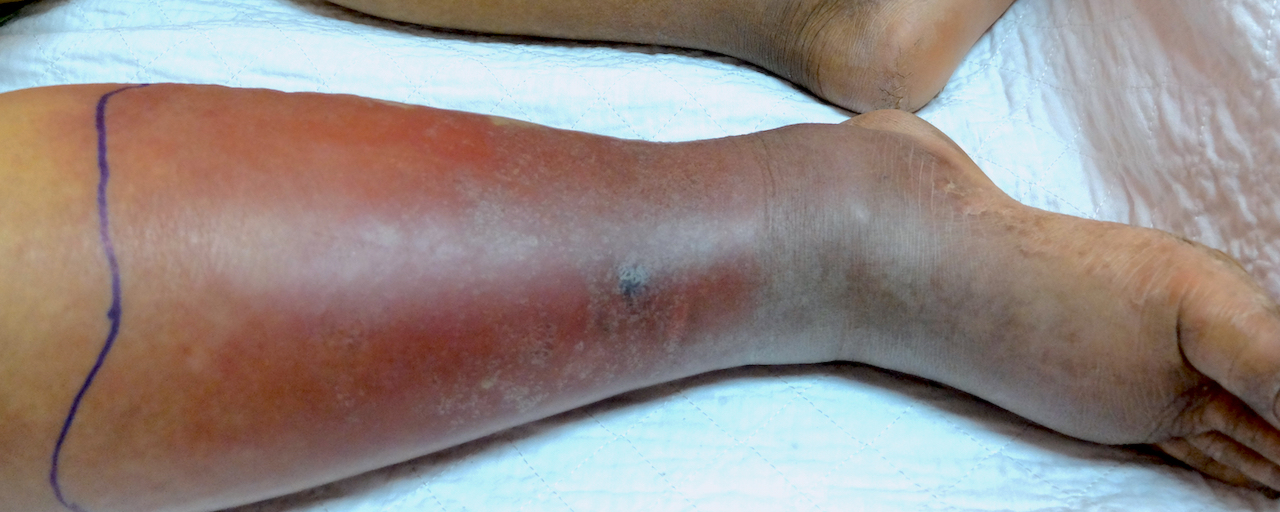Not to be confused with cellulite, cellulitis is a bacterial infection that can appear anywhere on your skin. It often affects the legs and usually begins after there’s trauma to the skin, which causes an opening and leads to an infection. This condition starts to spread to other parts of the skin and the soft tissues underneath, leaving you with a hot and tender sensation. The infection may cause swelling, pain, redness, warmth and pus.
Risk factors
Cellulitis is most commonly found in middle-aged and elderly people. A tear or break in the skin makes it easy for bacteria to creep in. Your risk is higher if you have:
- Open wounds.
- Dirty cuts.
- Dry-cracked skin.
- Eczema.
- Psoriasis.
- Varicose veins.
- Athlete’s foot.
- Animal bites.
- Insect bites.
- Leg ulcers.
- Diabetes.
- Cellulitis history.
- Areas where there’s lack of blood circulation.
Normally, the skin can heal quite easily. However, if your body’s ability to self-heal is affected, this leads to cellulitis infection. Risk factors that affect your body’s self-healing are:
- Being overweight
- A weak immune system
- chicken pox
- shingles
- lymphedema
Symptoms
Symptoms vary, but in most cases, the infection spreads fast and you could have a fever, sores on your skin or a rash that grows quickly. You may also feel tenderness and pain in the affected area, a glossy and tight appearance of the skin, and an area with abscess and pus formation.
Treating the infection
Antibiotics are the first choice of treatment. If it worsens or starts showing on your face, it’s time for a visit to your doctor. He may prescribe an intravenous antibiotic (injection through the veins) until the condition is under control, take a wound swab, X-ray, or draw blood from the area for more tests. He may give you oral medication to take at home.
Stay cellulitis-free
- Watch where you walk and avoid situations that may injure your skin while barefoot, like broken glass or on beach sand where you could step on broken shells. Be careful if you have swelling from circulatory problems too.
- If you injure your skin, sanitise your hands before you touch your wound.
- Wash the wound with soap and water to prevent infection and apply protective cream or ointment, and cover with a bandage.
- If you have animal bites, a deep tissue injury that has dirt, injury from contact with sea water and a puncture that involves stepping on a nail, be sure to see a doctor. Cellulitis can be dangerous.
It’s also important to stick to a healthy diet and boost your immune system to heal your wounds and fight off bacteria.
- Foods rich in flavonoids like blueberries, garlic, onion, grape seeds, ginger, cranberries and red wine are effective in fighting off bacterial infections.
- Drink plenty of water to help flush out harmful toxins in your body that can cause infections.
- Stock up on protein and Vitamin C-rich foods which are great for repairing damaged body tissues. Vitamin C boosts your immune system and lowers the risk of an infection.
- Stay clear of sugary, oily and fried foods as they may slow down the healing process.
- Eat green, yellow and orange vegetables, which boost immunity.
Call your doctor if you feel:
- Lightheaded
- Fatigue
- Chills
- Sweating
- Shaking
- Dizziness
- Muscle aches
- Blisters
- Skin dimpling
- Nausea
- Fever
References
- http://www.medicinenet.com/cellulitis/article.htm
- http://www.webmd.com/skin-problems-and-treatments/guide/cellulitis#1
- http://www.healthline.com/health/cellulitis#symptoms3
- http://www.medicalnewstoday.com/articles/152663.php
- http://www.mayoclinic.org/diseases-conditions/cellulitis/basics/prevention/con-20023471
- https://www.columbiadoctors.org/condition/cellulitis

